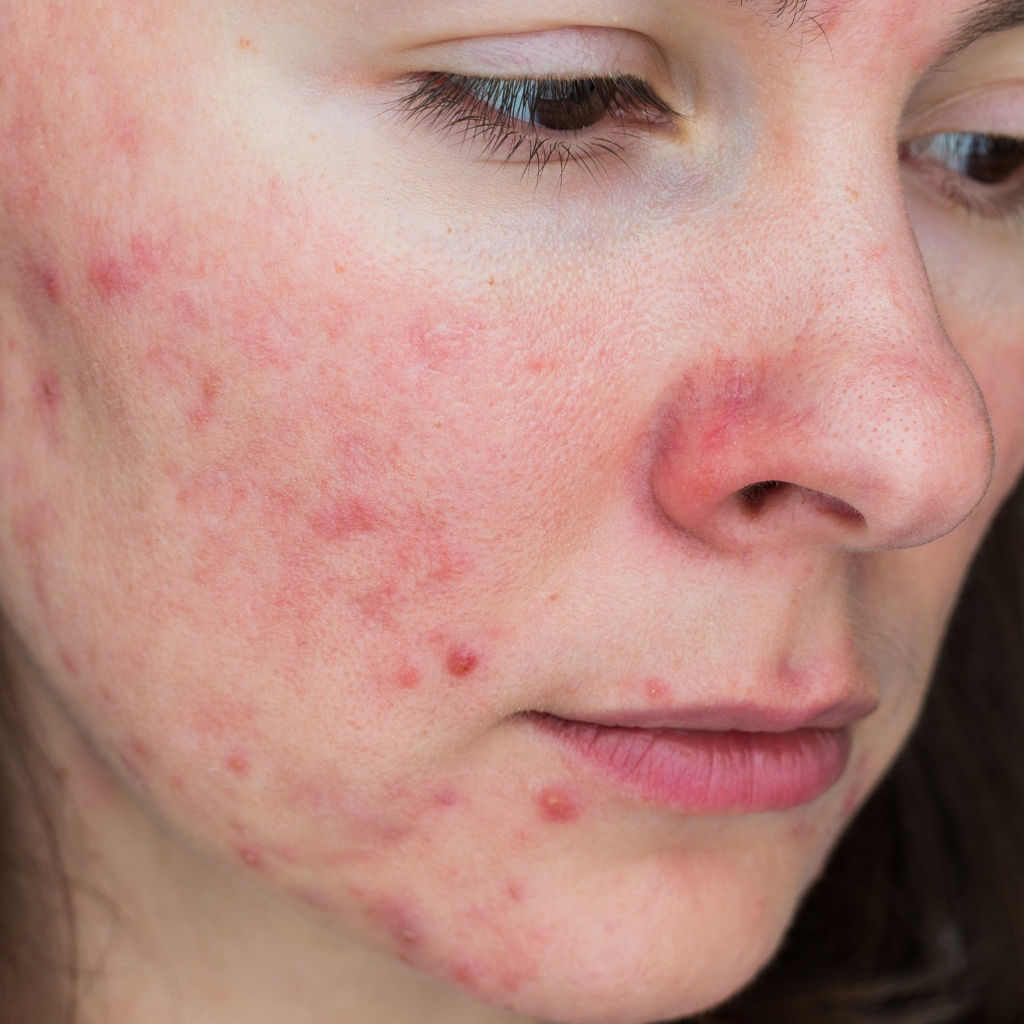All spots are not born equal and just because you have spots doesn’t mean you have acne. They could be a sign of a different skin condition depending on how they are formed and what other skin symptoms come with them.
In the UK it’s notoriously hard to get a referral to see a dermatologist. In the majority of cases less ‘serious’ skin conditions such as acne, it’s your local GP who will make an educated ‘guess’ at what skin condition you have and suggest treatments accordingly.
But what if your acne is actually something else, such as rosacea? Using treatments for the wrong skin condition could be making your skin worse not better or at the very least not helping improve your skin as much as it could be improved with the correct products for your skin condition.
The symptoms of rosacea can, especially in the early stages, look very similar to normal acne. “Rosacea in its initial stages is one of the most misdiagnosed skin conditions. However, catching and treating rosacea in its earlier stages is the most effective way of not letting it intensify and spread,” says Dermatologist Dr Eva Melegh
So how do you know if you have adult acne or rosacea?
 Dr Melegh gives her guide on how to tell the difference between adult acne and rosacea.
Dr Melegh gives her guide on how to tell the difference between adult acne and rosacea.
Adult acne
Here are the main symptoms and manifestations of adult acne
- Acne lesions tend to form on the lower part of the face along the jawline and around the mouth and nose as well as along the lower hairline and also the upper back. This is due to usually to raised cortisol from stress and hormonal disruptions.
- Most common age for adult acne is between 18-35 and affects men and women
- It’s usually accompanied by higher levels of stress
- Adult acne is not generally hereditary
- It can be triggered in women by use of hormonal contraceptive options or during or post pregnancy.
- It can be triggered in men and women from increased intensive exercise and weightlifting.
- Steroid use for muscle building also increases the risk of adult acne.
- In women it may get worse during menstruation
- The acne lesions can often form deeper in the skin and take 2-4 days to emerge to the skin’s surface and be painful with pressure and isolated inflammation
- There is often the presence of blackheads along with the isolated acne lesions
- The skin between the live acne is typically not affected
- Skin is not especially sensitive
- Skin tends to be a bit oilier
Treatments that usually lead to improvements
Moderate adult acne can usually be managed and controlled by over-the-counter products and a regular skincare routine. More severe forms may need medicated treatments.
- Regular exfoliation with either manual or chemical exfoliants
- Regular facials to remove blackhead and congested pores
- Pore-reducing toners
- Sebum purifying products
- Increasing good skin bacteria growth while targeting acne bacteria growth
- Overnight spot treatments on emerging acne lesions
- Reducing stress
- Not over moisturising
- Never leaving make up on overnight
Rosacea
Here are the main symptoms and manifestations of rosacea
- Acne lesions tend to form on the cheeks, end of the nose and between the eyes in a butterfly effect
- Most common age for rosacea is age 40+ and is more common in women, although men can also develop it.
- It’s often hereditary.
- Acne lesions come in the form of close clusters of small surface pustules that form quickly, often overnight or within less than 24 hours and burst quite quickly after appearing.
- The skin between or under the acne lesions is typically inflamed, red and bumpy and comes and goes in ‘flares, some of which can be quite severe and appear very suddenly, leaving skin feeling like its burning. Over the longer-term if left untreated the redness can become more permanent.
- Often the end of the nose becomes red and inflamed
- Skin flares are triggered by sudden temperature changes from hot to cold or vice versa, UV exposure, spicy food or alcohol (especially fizzy alcohol). Chemicals and perfumes in normal skincare products and cosmetics can also trigger acute reactive skin flares. Flares can also be triggered by acute emotional stress or embarrassment.
- Post-pregnancy and perimenopause can also be triggers
- Skin is typically very sensitive and reactive
- Skin can be oily in some patches but also become very dry and tight in patches, especially when the red skin and acne flare is in recession.
- Skin tone can often change, sometimes daily.
Dr Melegh’s skincare tips on how to effectively manage adult acne
Adult acne responds well to combinations of defence-building, skin-strengthening , anti-inflammatory anti-acne skincare regimes for sensitive skin rather than anti-bacterial treatments.
The key to treating adult acne is maintaining the integrity and balance of the healthy skin around the acne, while at the same time reducing the bacteria getting into the acne lesions. It’s crucial that skincare regimes and products do both as skin is more fragile, drier and more sensitive.
- Avoid products aimed at oily skin or teen acne which contain harsh anti-bacterial chemicals such as benzoyl peroxide or azelaic acid.
- Increase good skin bacteria to help skin fight acne bacteria. Try Clarol Silver Serum (clarol.co.uk) which contains a smart ingredient that inhibits the growth of bad skin bacteria while promoting the growth of good skin bacteria.
- Don’t exfoliate skin too often. 1-3 times per week is sufficient, not daily.
- Avoid using products that dry up or inhibit sebum production as adult skin needs all the natural moisturisation it can get. Instead use products that purify sebum production in order to prevent congestion. Try Clarol Sebopure (clarol.co.uk)
- Use water-free cleansing instead of foaming cleansers
- Use toners with pore minimising ingredients to clarify and further clean skin after cleansing.
Dr Melegh’s skincare tips on how to effectively manage rosacea
Rosacea is a more complex underlying skin condition than adult acne with multiple symptoms. It’s also a chronic skin condition that is caused by underlying vasodilation of skin cells and it tends to get worse with age.
If caught in its early stages is can be minimised and controlled with a regimented and targeted skin care routine with over-the-counter targeted products and lifestyle changes.
Medicated products and antibiotics may be needed for more severe symptoms though rosacea is renowned for not responding or reacting to medicated products so there’s unfortunately no single ‘fits all’ solution for this tricky skin condition. If left untreated it can spread to more areas of the face and the redness and bumpiness of the skin can become permanent. It can also spread into the eyes.
- Gentle and moisturising cleansing
- Avoid of make-up removers
- Avoid the use of harsh manual or chemical exfoliants
- Avoid using water for washing the affected areas as this can cause sudden temperature changes which can trigger flares
- Use only skincare products without perfumes
- Opt for targeted products that contain anti-redness, anti-inflammatory and de-sensitising ingredients plus prebiotics and which offer to treat the multiple symptoms of rosacea and not just the redness. Try Kalme Skincare (kalme.co.uk)
- Layer lighter creams and serums rather than singular heavier products so as not to over-burden reactive and fragile skin.
- Religiously use daily mineral UV protection in all weathers.
- Use dedicated treatment concealers for skin prone to rosacea to disguise redness rather than normal cosmetics
- Avoid direct sun exposure
- Avoid regularly switching skin care products and ingredients


